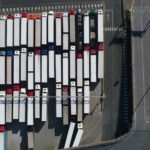News - Construction News
HGV coalition urges Transport Secretary for fair play on Clean Air Zones

Four UK trade associations have formed a coalition to voice their concern over the treatment of heavy goods vehicles (HGVs) operating in proposed Clean Air Zones.
The coalition – which comprises the Freight Transport Association (FTA), British Vehicle Rental and Leasing Association (BVRLA), National Franchised Dealers Association (NFDA) and Road Haulage Association (RHA) – is urging Transport Secretary Chris Grayling to provide more assurance that the introduction of Clean Air Zones (CAZs) will not unduly impact businesses reliant on HGVs.
Christopher Snelling, Head of UK Policy at the FTA, had this to say: “We support the need to improve the quality of air in our cities, but given CAZs only bring forward the beneficial change that is coming anyway by a couple of years, we don’t want this to be at the cost of small businesses’ ability to trade.”
Across England a growing number of cities are exploring Clean Air Zones as a means of curbing illegal levels of roadside emissions. London is ahead of the curve however, with an expanded Ultra Low Emission Zone planned for 8th April 2019.
“HGVs are an integral part of the economy at both national, regional and local level,” continued Mr Snelling. “Currently, there are no commercially or operationally viable alternatives to diesel in terms of HGV motive power. Over 90% of everything the public eat, drink, wear and build with travels on an HGV at some point in the supply chain.”
Though the coalition supports the thinking behind Clean Air Zones, it has asked the government to consider implementing measures which work for business as well as the environment. The approach currently proposed would tax thousands of businesses and disrupt supply chains across the country, says the coalition, while also falling short of the stringent air quality standards required.
The proposed HGV charge – which would apply to all vehicles other than the latest Euro VI model – typically sits at £100 per day, which could equate to a 25% increase on the daily running cost of a non-compliant vehicle. And its SMEs that will be worst affected; these are the operators least equipped to absorb a significant financial blow.
Efficient logistics are vital to keep Britain trading, say the FTA. With Brexit on the horizon and innovative new technology changing the way in which goods move across borders and throughout the supply chain, logistics have never been more important to UK plc.
If you would like to read more articles like this then please click here.
Related Articles
More News
- SMEs remain unprepared as cyber threats escalate
19 Apr 24
SMEs neglect cyber security, making them easy targets for a wide range of attacks, including
- I&G to build new Rob Burrow Centre for Motor Neurone Disease
18 Apr 24
I&G has been appointed to build the new Rob Burrow Centre for Motor Neurone Disease
- Glasgow Ship Build Hall progress
17 Apr 24
Turner & Townsend has been appointed as the New Engineering Contract Project Manager to support






